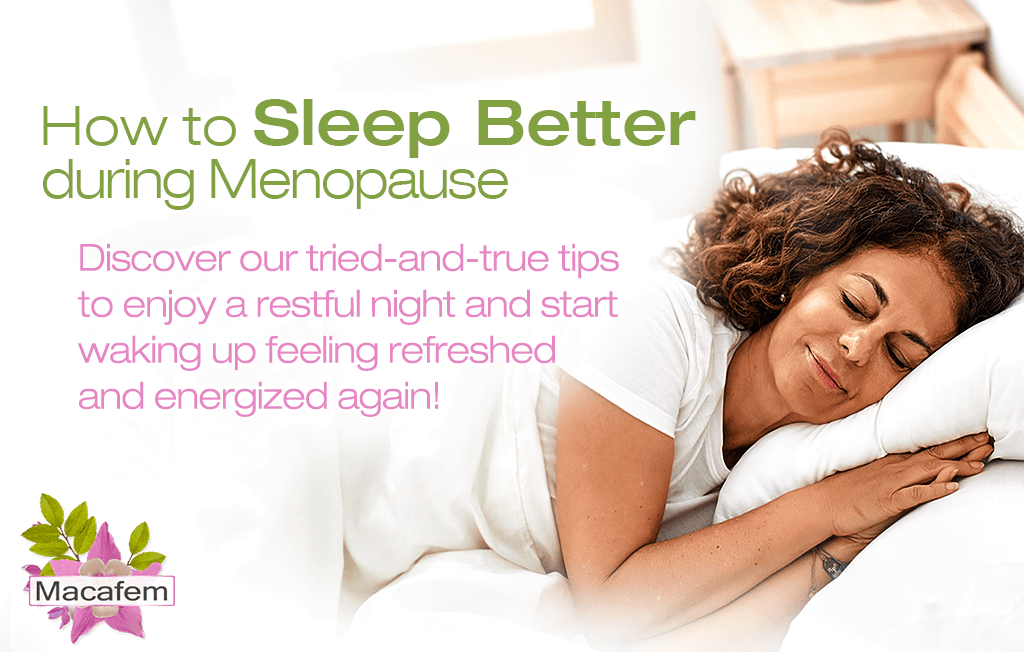How to Sleep Better During Menopause & Why It’s Important
“I haven’t had a full night’s sleep in months” is a common complaint among menopausal women. In fact, over 60% of menopausal women are affected by sleep problems. While their type, severity, and duration vary, their effects on women’s health and quality of life can be far reaching. In this article, we will explore everything you need to know about menopausal sleep problems, including tested tips to help you finally get a good night’s sleep.

What Sleep Problems Are Common in Menopausal Women?
Menopausal women most frequently report difficulties in falling asleep, frequent wake-ups, and early awakening. Their sleep throughout the menopausal transition can be interrupted by several factors, including:
- Night sweats. These nocturnal, sudden sensations of heat and sweating are especially disruptive to your sleep. Their prevalence ranges from 10 to 40% of women during menopause.
- Insomnia. This chronic sleep disorder is characterized by difficulty falling or staying asleep. Its prevalence increases with menopause, affecting as many as 60% of postmenopausal women.
- Sleep apnea. It’s a type of sleep disorder that leads to frequent lapses in breathing during sleep. Postmenopausal women are at a higher risk of developing obstructive sleep apnea.
- Mood disorders. Anxiety and depression during menopause are closely linked to sleep problems. While they’re more likely in perimenopausal women, they can certainly extend into postmenopause.
What Causes Sleep Problems during Menopause?
As with most other menopausal discomforts, the main culprit behind sleep issues during this stage are hormones, namely estrogen and progesterone.
These hormones are involved in much more than reproduction. They play key roles in bodily processes related to sleep, mood, respiration, temperature regulation, and more.
Changes in their levels may cause sleepiness by affecting sleep-wake cycles and other factors that may make it more likely to develop sleep disturbances.
The time of hormonal changes during menopause often coincides with other events in women’s lives that can cause emotional distress and disturb their sleep patterns. This can mean dealing with aging parents, kids’ entry into adulthood, increasing workplace expectations, and more
Why Is It Important to Sleep Better During Menopause?
Poor sleep has been proven to have negative consequences on one’s health no matter the age. However, it can be particularly debilitating for women going through intense hormonal changes during the transition.
Some of the ways through which sleep issues can negatively affect menopausal women include:
- They can worsen other menopausal symptoms, such as hot flashes.
- They can impair cognitive functions, like memory, concentration, and attention.
- They can increase the risk of mood disorders, like anxiety and depression.
- They can compromise immunity, heart health, and metabolism.
- They can lead to increased inflammation, blood pressure, and blood sugar levels.
- They can affect appetite and weight regulation, leading to obesity and diabetes.
- They can increase the risk of falls and injuries due to reduced alertness and coordination.
- They can take a toll on personal and workplace relationships and interactions.
How to Get a Good Night’s Rest in Menopause
Whether you tackle your sleep issues on your own or with the help of a sleep specialist, it all starts with creating healthy habits at bedtime.
These expert recommendations are easy to implement and can be tremendously beneficial for improving your sleep patterns. Consider the following:
- Stick to a consistent sleep schedule, which means going to bed and getting up at the same time every day. This will help regulate your sleep-wake cycles.
- Create a relaxing bedtime routine, such as taking a warm bath, listening to music, or meditating. Avoid screen time and other stimulations at least half an hour before going to bed.
- Keep up with regular exercise to reduce stress, improve mood, and maintain a healthy weight, which can all benefit your sleep. But don’t work out close to bedtime as it can make it harder to fall asleep.
- Opt for calming beverages before bedtime, like chamomile or valerian tea, instead of stimulating drinks, like coffee or strong tea. Also, avoid alcohol and nicotine.
- Keep your bedroom comfortable, quiet, and dark. Adjust the temperature, ventilation, and lighting to suit your preferences. You can also use fans and air conditioners to help with night sweats.
- Choose light, breathable clothes made from natural moisture-wicking materials, like bamboo rayon or satin. Use light covers instead of heavy blankets.
- Lessen the effects of hormonal fluctuations on your body with Macafem. It will nourish your endocrine system with beneficial compounds and help optimize its function, including sleep regulation.
Remember that you should contact your doctor or a sleep specialist if you have chronic or severe sleep problems affecting your daily life. They have a wide variety of tools at their disposal – from medications and medical devices to cognitive-behavioral therapy – to help you take care of your health.
Sleep is fundamental to optimal health, both physical and mental. This is particularly true during menopause when your body is going through intense, unfamiliar changes and needs deep, restorative sleep to tackle them. Don’t brush off your sleep issues as part of menopause. Commit to a simple plan, grab a bottle of Macafem, and start your path towards improved sleep today.
Harvard Health Publishing. (2020). Menopause and insomnia: Could a low-GI diet help? Retrieved November 1, 2023, from https://www.health.harvard.edu/blog/menopause-and-insomnia-could-a-low-gi-diet-help-2020011718710
Johns Hopkins Medicine. (n.d.). How Does Menopause Affect My Sleep? Retrieved November 1, 2023, from https://www.hopkinsmedicine.org/health/wellness-and-prevention/how-does-menopause-affect-my-sleep
National Institute on Aging. (2021). Sleep Problems and Menopause: What Can I Do? Retrieved November 1, 2023, from https://www.nia.nih.gov/health/sleep-problems-and-menopause-what-can-i-do
Sleep Foundation. (202). Menopause and Sleep. Retrieved November 1, 2023, from https://www.sleepfoundation.org/women-sleep/menopause-and-sleep
The North American Menopause Society. (n.d.). Sleep Problems. Retrieved November 1, 2023, from https://www.menopause.org/for-women/sexual-health-menopause-online/causes-of-sexual-problems/sleep-problems
Women’s Health Concern. (2021). Menopause and insomnia. Retrieved November 1, 2023, from https://www.womens-health-concern.org/wp-content/uploads/2022/12/17-WHC-FACTSHEET-Menopause-and-insomnia-NOV2022-B.pdf

